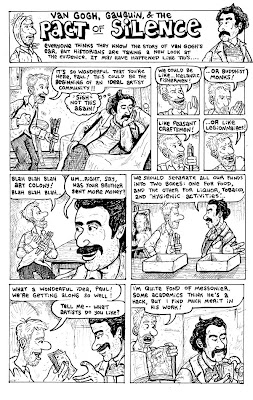


There are some historians who are questioning the story we've always been told about Van Gogh's ear.
This article tells it much better than I can. I'm not sure I'm convinced, but the truth is -- we don't know exactly what happened that night. Gauguin was not beyond lying to further his position and there does seem to be a pattern for Van Gogh experiencing remorse after his "episodes" and a pattern for covering for others. I was inspired to draw the story this way after reading the article I linked to, but I also highly recommend the books
"The Yellow House" by Martin Gayford and the new
Van Gogh biography by Naifeh and Smith. The story of how he created images of such joy and consolation out of a life so tragic is amazing. All of this material helps us to sort out the facts from that dispute the romanticized tale spun by early biographers.

 I made this comic strip about one of Warhol's interactions with Dali based on an account I read about. Some people say that without Dali, there wouldn't have been a Warhol -- kind of like Old Testament/New Testament. In one interview Andy was asked, "Did you know Dali claims to be a forerunner of pop art?" Andy's reply was, "Really? It's so hard to understand anything he says."
I made this comic strip about one of Warhol's interactions with Dali based on an account I read about. Some people say that without Dali, there wouldn't have been a Warhol -- kind of like Old Testament/New Testament. In one interview Andy was asked, "Did you know Dali claims to be a forerunner of pop art?" Andy's reply was, "Really? It's so hard to understand anything he says."














